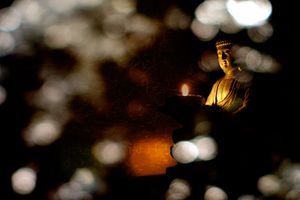January 7, 2020: Difference between revisions
(Created entry.) |
m (More tweaks.) |
||
| (One intermediate revision by the same user not shown) | |||
| Line 11: | Line 11: | ||
The author, Byron, concludes: “Understanding cause and effect develops our wisdom, experiencing impermanence brings us peace, and practicing mindfulness leads to fulfillment.” | The author, Byron, concludes: “Understanding cause and effect develops our wisdom, experiencing impermanence brings us peace, and practicing mindfulness leads to fulfillment.” | ||
OK, fine. However, I’m not sure how I can do any of these things. It seems like I get more angry and stressed | OK, fine. However, I’m not sure how I can do any of these things. It seems like I get more angry and stressed the older I get. I thought it was supposed to be the other way around? ''Everything'' bothers me. I can’t seem to accept anything with equanimity: it’s like the universe has something against me. If it’s annoying or inconvenient, it’ll find me. ''Everything'' is a hassle. I’m insomniac ''most'' of the time. Byron suggests that the above help in developing and practicing “loving kindness,” and all I can think about is the utter futility of my ever getting anywhere close to either ''love'' or ''kindness''. | ||
What is my problem? | ''What is my problem?'' | ||
I saw another post on Reddit about getting a teacher. Shainberg | I saw another post on Reddit about getting a teacher. Shainberg had a master to guide him; maybe I need the same? Maybe an analyst, like [[December 4, 2019|Susan Mailer]] had for a decade? Anti-depressants? Pot? As my friend Walter said once about his relationship to green tea: “it winds me up tighter than a banjo string.” Shit, ''life'' does that to me. | ||
I didn’t mean for this to take a confessional turn—I had the intention of writing about how modern life is less conducive to living like a Buddhist. That it’s easy to practice these things when you’re a monk. That maybe all I can do is try to eliminate as much conflict, chaos, and clutter from my life as I can. Yeah, this was supposed to be a minimalism post. I’ve been edgy lately for no apparent reason. I’m just not sure what to do about it. | I didn’t mean for this to take a confessional turn—I had the intention of writing about how modern life is less conducive to living like a Buddhist. That it’s easy to practice these things when you’re a monk. That maybe all I can do is try to eliminate as much conflict, chaos, and clutter from my life as I can. Yeah, this was supposed to be a minimalism post. I’ve been edgy lately for no apparent reason. I’m just not sure what to do about it. | ||
Latest revision as of 18:12, 8 January 2020
Me? A Buddhist? I Wish...
I came across this article on Reddit today: “3 Things I Learnt as a Buddhist Monk.” Since I’ve been trying to write this review, I needed a refresher on Buddhism, and this article appeared serendipitously (karmicly?). It didn’t really give me any new information, but what it did state was depressing.
In a nutshell, what he learned is (and I’m paraphrasing):
- Realize that every cause has an effect and every effect results from causes and conditions, including our brains and their activities.
- Accept that everything is impermanent, so live for the now.
- Be mindful.
The author, Byron, concludes: “Understanding cause and effect develops our wisdom, experiencing impermanence brings us peace, and practicing mindfulness leads to fulfillment.”
OK, fine. However, I’m not sure how I can do any of these things. It seems like I get more angry and stressed the older I get. I thought it was supposed to be the other way around? Everything bothers me. I can’t seem to accept anything with equanimity: it’s like the universe has something against me. If it’s annoying or inconvenient, it’ll find me. Everything is a hassle. I’m insomniac most of the time. Byron suggests that the above help in developing and practicing “loving kindness,” and all I can think about is the utter futility of my ever getting anywhere close to either love or kindness.
What is my problem?
I saw another post on Reddit about getting a teacher. Shainberg had a master to guide him; maybe I need the same? Maybe an analyst, like Susan Mailer had for a decade? Anti-depressants? Pot? As my friend Walter said once about his relationship to green tea: “it winds me up tighter than a banjo string.” Shit, life does that to me.
I didn’t mean for this to take a confessional turn—I had the intention of writing about how modern life is less conducive to living like a Buddhist. That it’s easy to practice these things when you’re a monk. That maybe all I can do is try to eliminate as much conflict, chaos, and clutter from my life as I can. Yeah, this was supposed to be a minimalism post. I’ve been edgy lately for no apparent reason. I’m just not sure what to do about it.
